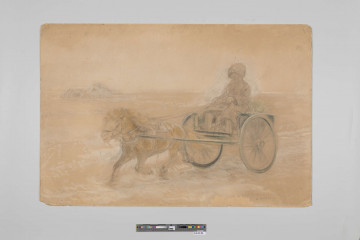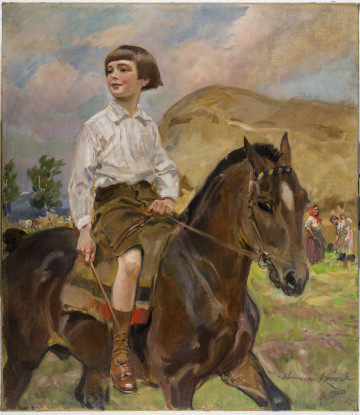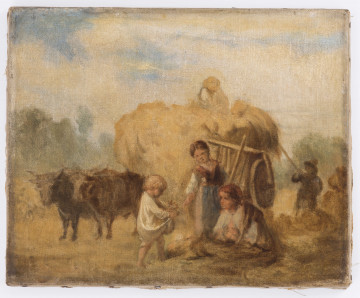
War in 1915. Kalmyks in Poland
1915
National Museum in Lublin
Part of the collection: Genre scenes (19th–1st half of the 20th c.)
Franciszek Kostrzewski, a creator of realistic genre scenes set in the landscape of Polish villages and towns, was artistically shaped by the environment of the Warsaw School of Fine Arts, which opened in 1844. The Department of Fine Arts at the University of Warsaw had been closed since 1816 as part of repressions after the November Uprising. The painter was among the first graduates who formed a bohemian artistic group known as the Marcin Olszyński Group. Olszyński, the group's leader, guardian of artists and patron of culture, one of the first professional photographers, was the author of many initiatives (including the Zachęta Society).
The artists, departing programmatically from classicist-idealist tendencies dominating in the domestic art, the representatives of which were the pedagogues of the School of Fine Arts Ch. Breslauer, R. Hadziewicz, A. Kokular, and M. Zaleski, turned to areas hitherto neglected – the everyday life of the lower classes in ordinary surroundings. An important manifestation of this interest was ethnographic ‘walking tours’, providing the opportunity for outdoor studies. Their participants had the opportunity to get to know the native landscape and its inhabitants. Numerous works were the aftermath of the expeditions, including over six hundred drawings and watercolours by Kostrzewski in seven albums made for Olszyński.
Travel experiences, fascination with 17th-century Dutch painting, inborn satirical talent, and painting technique acquired in F. Piwarski's workshop contributed to the character of the artist's art. Most of his paintings are compositions with genre scenes, often with anecdotic and satirical undertones. The painter intended to show the life of provincial people in its various manifestations. Although based on the observation of reality, both painted landscapes and figures present certain model types illustrating the critical and social message assumed by the author. His favourite landscape background was the village of Kielce, with which he had been connected since childhood. Compared to the staffage, which occupies a small space on the canvas, the landscape is often a comparable subject. The features of Kostrzewski's work can be seen in Rozmowa plebana z Żydem [Conversation Between a Parson and a Jew] from 1857.
Bożena Kasperowicz
Author / creator
Dimensions
cały obiekt: height: 55 cm, width: 45 cm
Object type
painting
Technique
oil technique
Material
oil-based paint, canvas
Creation time / dating
Creation / finding place
Owner
The National Museum in Lublin
Identification number
Location / status

1915
National Museum in Lublin

1923
National Museum in Lublin

1870 — 1879
National Museum in Lublin
DISCOVER this TOPIC
National Museum in Lublin
DISCOVER this PATH
Educational path